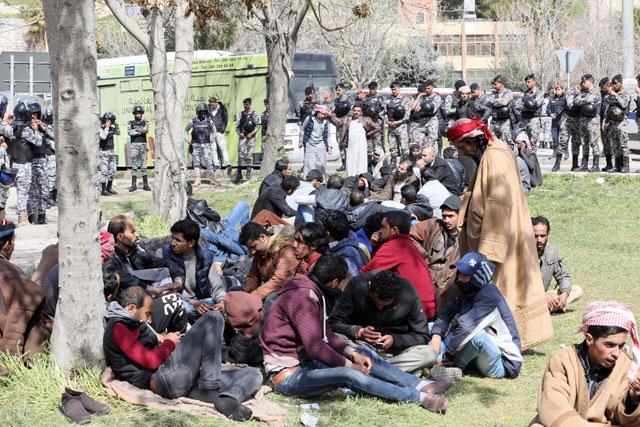You are here
‘Gov’t cannot possibly employ more’: Experts say as they weigh in on demonstrators’ demands
By Maram Kayed - Mar 11,2019 - Last updated at Mar 11,2019

In this undated photo, demonstrators hold a sit-in outside the Royal Court. Experts commented on the jobseekers’ situation after the protesters recently met with government officials (JT file photo)
AMMAN — Political experts recently weighed in on the latest demands from jobseekers protesting unemployment, and provided socioeconomic explanations of their requests as well as possible outcomes of the negotiations between them and the government.
The protests, which originated in Aqaba and then spread through the south, were organised by young males asking for jobs after years of unemployment.
In response to the protests, and after His Majesty King Abdullah directed the government to make combating unemployment its number-one priority, ministers and senior officials began discussions with the youth.
The solutions the government tried to provide revolved around opportunities in the private sector, something that Labour Ministry Spokesperson Mohammad Khatib said “the jobseekers completely refused, demanding government jobs and nothing else”.
However, only a few months before, the University of Jordan (UJ) which is a public university, announced that it had 1,500 extra employees.
Still ongoing as well, is a widely-covered case at Al Bashir Hospital, where 800 workers were reportedly registered on the payroll without showing up to work.
These circumstances, along with the county’s current financial situation, pose a “conundrum” for the government, according to crisis management expert and head of the Political Science Department at UJ, Waleed Abu Dalbouh.
“The government cannot possibly employ more people when it is already struggling with a problem of over-sufficiency,” he told The Jordan Times.
He added: “It is quite puzzling that the youth would make those specific demands in the first place. You would not expect someone who is in dire need of a job to refuse anything thrown his way. In this economy, people should grip on to whatever they can.”
However, political commentator and Assistant Professor of Political Science Bader Madi said that the youth “live in a society where only desk jobs, in particular administrative ones, are actually considered as jobs. That is why when you throw any alternative their way, they will not take it seriously and think you are trying to trick them”.
Abu Dalbouh also drew on the fact that citizens usually regard jobs provided by the government as “more secure” and “less tense”.
“These young men know that once you are hired in the government sector, there is little to no immediate monitoring, and no terminations. Meanwhile, the private sector could quite easily dispose of them if they are not giving it their all, or closely following regulations,” Abu Dalbouh said.
He added that “I would say some, not necessarily all, want an easy ride.”
In the private sector, as Madi noted, competition is a strong element. “You have to prove that you deserve the job. There is definitely more extra space for growth and entrepreneurship in private companies, but that is not something a laid-back person would want over job security.”
Considering the social and economic factors, the “best” possible outcome of the negotiations, according to Abu Dalbouh, would be private-sector jobs with a “guarantee of employment for a considerable amount of time”, given that no misconduct is committed by the employee.
In the longer run, however, Madi stressed that private businesses, specifically in the south, should turn to recruiting local residents before bringing in foreign labourers, or labourers from other cities.
“If there were more academies and training centres to provide the local youth in the south with the necessary skills needed for jobs in the private sector, the problem would naturally solve itself, as businesses would have competent employees, and youth would have a stable jobs,” he said.
Madi added: “The frustration that we see from youth now is the work of years of indignation towards opportunities taken by others as they looked on.”
A financial and socioeconomic expert, who preferred to remain anonymous, said that the jobseekers protesting should “keep in mind that they will not find work unless they have qualifications... so being offered a first nudge [opportunity] now is something they should jump at rather than reject”.
Related Articles
AMMAN — The Council of Ministers on Thursday called for jobseekers protesting in front of the Royal Court engage in dialogue and accept open
AMMAN — The Ministry of Labour on Wednesday confirmed that it was still following up on the issue of jobseekers coming on foot from Aqaba an
AMMAN — Recruitment in the public sector, including employment under contracts, must be based on clear and transparent selection criteria wi


















